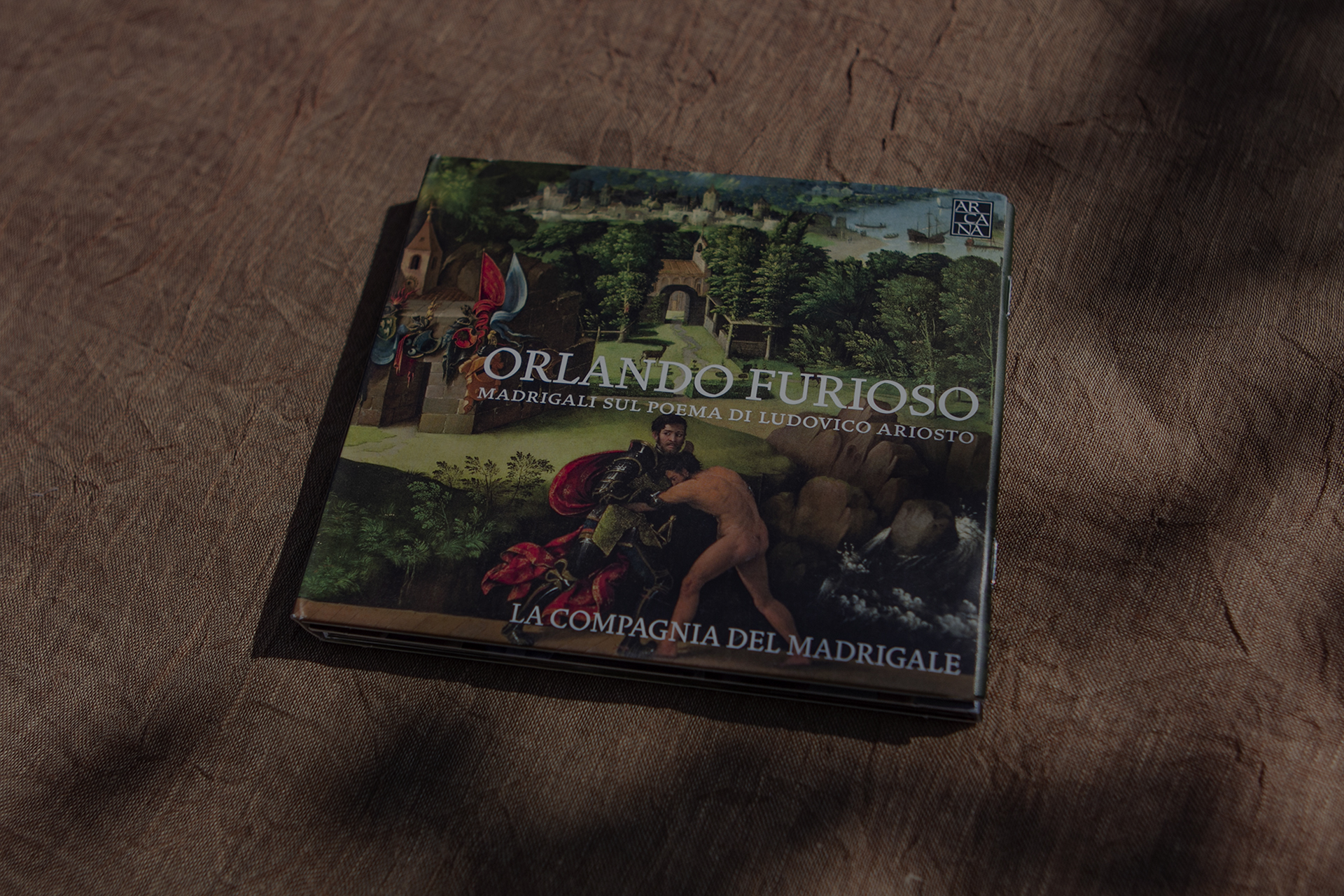Questa antologia, frutto di una selezione compiuta con grande sensibilità musicale da Giuseppe Maletto, offre una sapiente ricognizione degli stili e delle tendenze espressive che caratterizzarono l’incontro fra il poema ariostesco e la musica nel periodo di maggior fortuna musicale: si tratta di madrigali pubblicati tra il 1541 e il 1588. I brani qui interpretati con rigore filologico ed intensità espressiva dalla Compagnia del Madrigale, consentono un percorso di asThis recording, fruit of a careful and sensitive musical selection by Giuseppe Maletto, offers an expertly assembled compendium of expressive styles and trends which characterized the meeting of Ariosto’s poem with music during the period of its greatest musical popularity. The musical selections consist entirely of madrigals published between 1541 and 1588. The pieces included here, performed with historical authenticity and expressive intensity by the Compagnia del Madrigale, recount the vicissitudes of Orlando Furioso in music as it intertwines the history and geography of the madrigal, in a journey which traverses the cultural cities of Ferrara, Florence, Mantua, Milan and Rome, in the courts and accademie where it was created. colto lungo le vicende dell’Orlando furioso in musica che intreccia la storia e la geografia del genere musicale del madrigale – di centri quali Ferrara, Firenze, Mantova, Milano, Roma e dei luoghi, ovvero corti e accademie, deputati alla sua produzione.
The texts sung here – twenty-five stanzas in all, in twenty-two musical compositions – recount the principal events of Orlando Furioso. The epic poem of the war between Muslims and Christians lies at the heart of the entire narration. The tale features the love story between the beautiful Angelica, in flight from her many suitors, including the paladin Orlando. The poem ends with the encomiastic tale of the star-crossed love between the pagan warrior Ruggiero and the Christian Bradamante. After Ruggiero’s conversion at the end of the war, the couple will succeed in crowning their love and giving birth to the house of the Este. Other episodes in the poem include Ruggiero’s arrival on the island of the sorceress Alcina, Olympia’s desperation after being abandoned by her unfaithful consort, and the love between Bradamante’s brother Ricciardetto and Fiordispina.
(Cecilia Luzzi)



ORLANDO FURIOSO Madrigali sul poema di Ludovico Ariosto | A 363
LA COMPAGNIA DEL MADRIGALE
Rossana Bertini, soprano
Nadia Ragni, soprano
Elena Carzaniga, alto
Giuseppe Maletto, tenor
Raffaele Giordani, tenor
Paolo Borgonovo, tenor
Marco Scavazza, baritone
Daniele Carnovich, bass
Production details
Total playing time: 69:49
Recorded in Roletto, Italy, in October 2009 and September 2010
Engineered by Davide Ficco and Giuseppe Maletto
Produced by Sandro Naglia and CDM
Booklet essay by Cecilia Luzzi
English – Français – Italiano – Deutsch
Track list:
1 Le donne, i cavallier, l’arme, gli amori
Hoste da Reggio (c.1520 – 1569)
2 Pensier (dicea) che ‘l cor m’agghiacci et ardi
Orlando di Lasso (1532 – 1594)
3 La verginella è simile alla rosa
William Byrd (1539/40 – 1623)
4 Vaghi boschetti di soavi allori
Giaches de Wert (1535 – 1596)
5 Tra le purpuree rose e i bianchi gigli
Benedetto Pallavicino (c.1551 – 1601)
6 Non tanto il bel palazzo è sì eccellente
Giaches de Wert
7 Era il bel viso suo, quale esser suole
Cipriano de Rore (1515/16 – 1565)
8 Liete piante, verdi erbe, limpide acque
Vincenzo Ruffo (1510 – 1587)
9 Queste non son più lagrime che fuore
Giaches de Wert
10 Queste non son più lagrime che fuore
Philippe Verdelot (c.1480/85 – 1530/32?)
11 Queste non son più lagrime che fuore
Bartolomeo Tromboncino (c.1470 – 1535)
12 Questi ch’indizio fan del mio tormento
Alfonso Ferrabosco (1543 – 1588)
13 Non rumor di tamburi o suon di trombe
Alessandro Striggio (1536/7 – 1592)
14 Se ben non veggon gli occhi ciò che vede
Giovanni Pierluigi da Palestrina (1525 – 1594)
15 Gli sdegni, le repulse e finalmente
Hoste da Reggio
16 Di qua di la va le noiose piume
Orlando di Lasso
17 Deh perché voglio anco di me dolermi?
Orlando di Lasso
18 Chi salirà per me, madonna, in cielo
Giaches de Wert
19 Dunque baciar sì belle e dolce labbia
Andrea Gabrieli (1532/33 – 1585)
20 Scarpello si vedrà di piombo o lima
Perissone Cambio (c.1520 – 1562)
21 Come la notte ogni fiammella è viva
Cipriano de Rore
22 Or se mi mostra la mia carta il vero
Alessandro Striggio
premi

